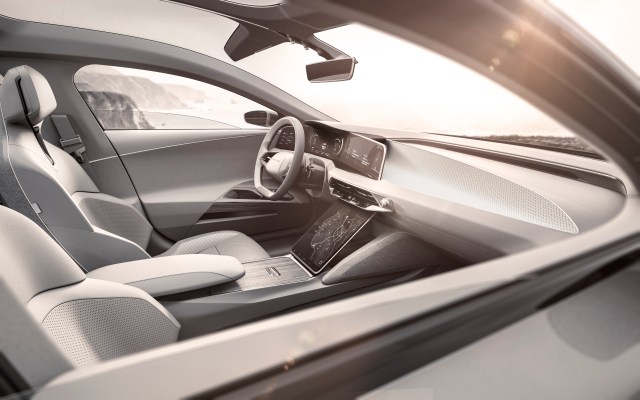Now that we know that the Lucid Air will start at $60,000 (before applying the federal tax credit that’s available for electric vehicles), people are going to start comparison shopping. The first competitor that springs to mind is that other all-electric luxury sedan, the Tesla Model S.
The Air is significantly less expensive than the Model S 60, especially at the base level, where the Model S starts around $80,000. They have a similar per-charge range, with the Air expected to have 240 miles and the Model S 60 at 210 miles, as rated by the EPA. They also have similar storage space in two trunks — front and rear — with 32 cubic feet combined in the Air and 31.6 cubic feet in the Model S.
They also share a capacity for autonomous driving but not the ability. All the hardware is in place, but you’ll need to pay extra for the software that makes it happen. For that matter, Tesla and Lucid offer long lists of optional equipment that will send the price soaring well over six figures. Lucid will have a 1000-hp option, while the Model S Premium Upgrades package has the Bioweapons Defense Mode. Your selection depends on whether you want to outrun the apocalypse or run it through filters.
But Lucid CTO Peter Rawlinson said in an interview at CES 2017 that Tesla, which he admires for “making it look easy,” was not Lucid’s top competitor. Lucid Motors is gunning for more established sports luxury brands like Audi, BMW, and Mercedes-Benz. The amenities in the Air are in this class, like four screens (three of which are touch screens), 12-way power front seats and rear seats that recline 55 degrees.
Its closest Audi competitor is likely the A7, which starts just under $70,000. It’s got 333 horsepower, which the base model Air betters by 67 horses. It has 24.5 cubic feet of storage space, among the best in its class but far less than the Air. But the A7 has some features that we don’t know if the Air will include, like standard heated seats, navigation, and compatibility with Apple CarPlay and Android Auto.
The BMW 640i starts at around $77,000, with a six-cylinder engine that produces 315 hp. ADAS systems, like active cruise control and pedestrian detection, are optional, though navigation and heated seats are standard on all 6-series models. Its cargo space is average for the class at 16 cubic feet, which seems paltry compared with the EVs.
The Mercedes CLS starts at about $67,000, making it closest in price to the Lucid Air. It’s got 329 hp in the CLS400, so the Air is the clear winner in the power department. Active brake assist is standard in the CLS400, as are Mercedes’s Pre-Safe automatic braking system and Attention Assist, which lets you know when you’re too sleepy to drive. But the CLS is the biggest loser in cargo space, with 15 cubic feet in the trunk — less than half of what you’ll find in the EVs’ two trunks.
Lucid plans to build 10,000 cars in its first year of production, which will take place in Casa Grande, Arizona. Prototype cars have had most of the technology in place, but not the refined interior design and state-of-the-art infotainment systems luxury buyers expect. A top-notch interior will be a requirement for any buyers who are toying with the idea of crossing over from a century-old sports luxury brand to a new alternative-fuel sedan.
